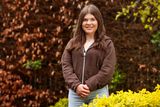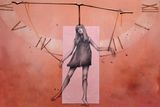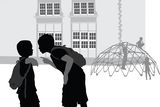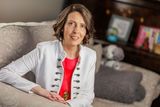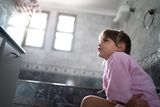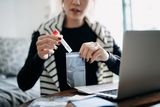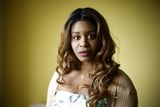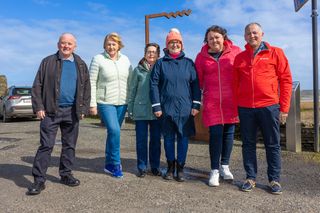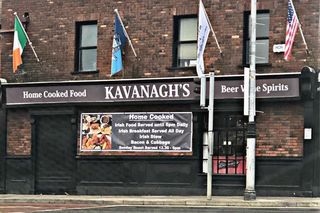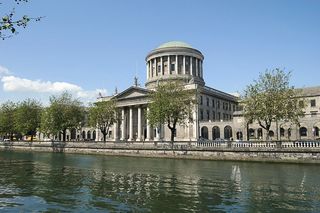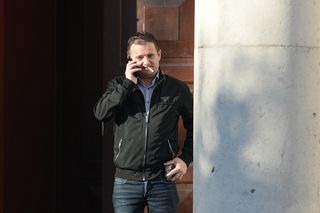Arc of Light: the support services available for cancer patients and their loved ones
A diagnosis of cancer is frightening, but there is support out there. Edwina Halpin tells our reporter about an organisation that provides therapeutic services for those with the disease, as well as their carers and loved ones
Edwina Halpen was stunned by her cancer diagnosis as her previous smear had been clear. Photo: Tony Gavin
Edwina Halpin grew up in a picturesque village called the Hill of Down, which is next to the Royal Canal, not far from Kinnegad in Co Meath. In a way, that particular place name aptly describes some of the darkness she faced following a difficult medical diagnosis, and her uphill journey to reach the sense of peace and acceptance that fortunately did ensue.
Although Edwina (38) one of four girls, studied tourism after school, she is now happily employed in the customer-services department of a pensions and investment company in Dublin. She lives in Bluebell, a suburb close to the city centre. So, all was going well until a few years ago, when she started to feel really tired and experienced back pain.
"There were days I'd have no energy at all," she says. "I put it down to stress." Eventually, she went to a Dublin GP for a check-up and a routine smear test. While examining her, the doctor dropped a bombshell. "She told me my cervix just didn't look right," Edwina recounts. "I was stunned. I really and truly wasn't expecting that. My last smear test had been perfectly normal."
Following the doctor's reassurances, Edwina put it to the back of her mind.However, two weeks later, when she went to get the results of the test, she was informed that there were signs of abnormal cells in her cervix. So she was referred to the Coombe Women's and Infants' University Hospital in Dublin, for a colposcopy, which would examine her cervix and surrounding tissue in more detail.
At the time, Edwina was planning to go to the Canary Islands with one of her sisters, and she was really disappointed that her first real break in years might have to be cancelled. However, the doctor urged her to go ahead with her plans.
Following the holiday, Edwina's mother and sister offered to accompany her to the hospital for the colposcopy, but she felt it would be too much for them to travel up and down. So she went alone, and had the surreal experience of waiting in the colposcopy unit while Jeremy Kyle did his inimitable thing on the waiting-room TV.
Finally, it was her turn. "A specialist nurse did the colposcopy," Edwina explains. "She did a punch biopsy; then she used a dye to identify suspicious cells. She took photos, and explained what needed to happen next. I felt very vulnerable, but I knew I had to accept what was happening." When Edwina asked if it was cancer, the nurse said it probably was; the next logical step was a cone biopsy and other tests, to get a definite diagnosis. At that point Edwina, not surprisingly, burst into tears.
Afterwards, she walked all the way to the Luas, rather than having to explain her tears to a random taxi driver. She continued to cry while the tram glided towards Bluebell, and was still in tears when she opened the door of her empty home.
"Then I called my mother," she says simply. Edwina's father and sister immediately drove to Dublin to bring her home. A couple of days later, she was somewhat relieved to learn that her cancer had been caught early; but given that at least two types of cells had been identified, further investigations would be required.
A couple of weeks later, she saw an obstetrician gynaecologist, who recommended Edwina have a cone biopsy, and MRI and PET scans. In the meantime, he introduced her to a liaison nurse, who was able to answer most of Edwina's questions and to manage her treatment plan. Soon after, the tests confirmed a diagnosis of stage 2B adenosquamous carcinoma.
"The consultant said it wasn't the most common kind; and while it had already spread outside my cervix, it hadn't reached my lymph nodes," Edwina explains. "I was told I would need radiation and chemotherapy."
As if having cancer wasn't bad enough, Edwina had to deal with an additional bombshell. She was somewhat shocked to learn she would lose her fertility because of the treatment. However, she was offered the option of having her eggs frozen for use at a later date. But if she chose to continue that process, she would have to use a surrogate to carry the baby.
"I didn't want to go down the road of surrogacy," she says candidly. "I'm 38, and I'm very happy just to be here and to be well. Having children is not a big thing for me. There are lots of other ways to have a fulfilling life."
In Edwina's case, radiation became her main treatment; she had 25 external sessions and three internal ones. She had four chemotherapy treatments and was off work for over a year.
"My bosses were very good," she says. "And I was very much cosseted by my parents at home. It was the depths of winter. I did a lot of sleeping by the fire, in a lovely peaceful environment. Christmas 2014 was surreal, listening to Frosty the Snowman while receiving radiation. I couldn't eat my Christmas dinner because I had no appetite, and we couldn't have visitors because my immunity was low."
Then, one day, the oncologist told Edwina the treatment was finally done, and she was ecstatic. "It was wonderful to go home and sleep and wait for the side effects of the drugs to wear off; some of them make you feel so nauseous and tired, you can hardly keep your eyes open," she says.
In March 2015, Edwina was introduced to Eithne Weymes, at the Arc cancer support drop-in centre on the South Circular Road in Dublin (there's another near the Mater Hospital). "Once I'd explained what I'd been through, she suggested different therapies to me," Edwina recalls.
She chose bio-energy healing, massage, acupuncture (to counteract the side-effects of the cancer treatment) and counselling. She also did group meditation and visualisation, and feels very much stronger because of the services, which are all free.
"At Arc, you get a great sense of camaraderie; that you are not on your own, and that makes you feel very supported. They helped me move on with my life," Edwina says. "The good news is that I am now over a year in remission, having got my first clear scan in May of last year. They tell me that I have a good prognosis, and I am very much looking forward to the future."
Edwina is now back at work part-time, and she has dedicated herself to raising funds for Arc.
The Arc Cancer Support Centres' Torch of Hope relay takes place around Dublin Bay on Sunday, October 9, when cancer survivors, their families and friends, and the relatives of those who have passed away come together to celebrate life and to remember loved ones.
To register to take part, tel: (01) 830-7333 or see arccancersupport.ie
Join the Irish Independent WhatsApp channel
Stay up to date with all the latest news
